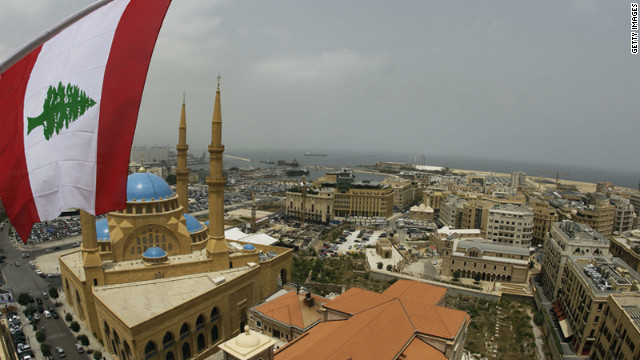A senior Hezbollah commander was gunned down outside his home, the Lebanese Shiite group reported Wednesday, marking a further escalation in a shadowy series of attacks and bombings that risk drawing Lebanon deeper into the region’s simmering sectarian strife. The militant Iranian-backed movement immediately blamed Israel for the assassination and warned that it would suffer […]

By Georges Pierre Sassine, Special to CNN
Editor’s note: Georges Pierre Sassine is a political activist who writes about Lebanon’s public policy issues at www.georgessassine.com. The views expressed are the writer’s own.
Lebanese may have enjoyed celebrating 70 years of independence last week. But they will also have been fully aware of something much less welcome – nine months of political gridlock. Since March, Lebanon has been unable to form a new government, parliamentary elections held in June were postponed for 18 months, and the current caretaker government has no decision-making powers. As the gridlock persists, Lebanon is slowly losing its ability to manage the spillover from Syria’s war – and a cynical Lebanese society is debating three responses to tackle the country’s malaise.
The first response is simply a “wait and see” policy, rooted in a firm belief that geopolitics supersedes domestic politics. To succeed, this approach requires a resolution of the crisis in Syria. The second response is more inward looking, a belief that the gridlock can be overcome through constitutional reforms and a rethink of Lebanon’s political system. The third, more cynical, response calls for the complete partition of the country.
Lebanon was ranked in 127th place in a survey carried by graft watchdog Transparency International on corruption in the public sector in 177 countries. TI collates expert views on the problem from bodies such as the World Bank, African Development Bank, Economist Intelligence Unit, Bertelsmann Foundation, Freedom House and other groups. It then ranks […]
Lebanese may have enjoyed celebrating 70 years of independence last week. But they will also have been fully aware of something much less welcome – nine months of political gridlock. Since March, Lebanon has been unable to form a new government, parliamentary elections held in June were postponed for 18 months, and the current […]
President Michel Suleiman, caretaker Prime Minister Najib Miqati, and Army Commander General Jean Qahwaji held a meeting on Monday to tackle the latest unrest in the northern city of Tripoli between the rival Bab al-Tabbaneh and Jabal Mohsen neighborhoods, reported LBCI television, Miqati told LBCI that the gatherers agreed to “turn Tripoli into […]

The Free Syrian Army began as a simple group of fighters battling Assad. But Ruth Sherlock, in Antakya, finds their mission is now making millions from bribery and extortion
The Free Syrian Army commander leant against the door of his four-wheel drive BMW X5 with tinted windows and watched as his men waded through the river on the Syrian border moving the barrels of smuggled petroleum to Turkey.
Feeling the smooth wedge of American bank notes he had just been given in exchange, he was suddenly proud of everything he had become.
In three short years he had risen from peasant to war lord: from a seller of cigarettes on the street of a provincial village to the ruler of a province, with a rebel group to man his checkpoints and control these lucrative smuggling routes.
The FSA, a collection of tenuously coordinated, moderately Islamic, rebel groups was long the focus of the West’s hopes for ousting President Bashar al-Assad.
But in northern Syria, the FSA has now become a largely criminal enterprise, with commanders more concerned about profits from corruption, kidnapping and theft than fighting the regime, according to a series of interviews with The Sunday Telegraph.
Researchers of criminal theory have often argued that the true objectives of terrorist attacks are not related to those who die, but to those who survive, including far from the target. This explains why their actions are called "TERRORism." The literal and conceptual senses of the word "terrorism" do not necessarily mean to kill. […]



